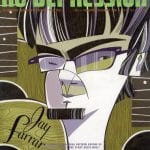John “Mambo” Treanor: 1953 to 2001
August found the heart of Austin, Texas, beating in a mournfully irregular fashion after the loss on August 20 of John “Mambo” Treanor, arguably the city’s most prolific, eccentric and best-loved drummer. Mambo, 48, died after what is usually referred to as a “brave battle with cancer.” In Mambo’s case, people could’ve been forgiven for thinking that the Big C didn’t have a chance in hell: The veteran of literally scores of Austin’s best bands and every worthwhile musical genre was playing regular gigs up until the week before he died.
The huge roster of bands and solo artists who benefited from Mambo’s unique talent and infectious spirit included Kris Kristofferson, Jon Dee Graham, Toni Price, Abra Moore, Beto y Los Fairlanes, the Vanguards, Guy Forsyth, Passenger, and the Resentments. He was also notorious for one of his more unusual hobbies — making hats out of mammalian roadkill. He wore his skunk hat when he subbed at a hasty reunion of former Austin favorites the Skunks, which also featured Jon Dee Graham on guitar, and me on bass and vocals.
We played and lived in the same town for 25 years, but the two of us had never met until about two years ago. I’d always thought of Mambo as a jazz drummer, and back in the Skunks’ heyday — the late ’70s and early ’80s — guys like me looked down at jazz freaks, especially because we thought they were always looking down their noses at us. My ignorance was my loss.
It took cancer to bring us together. In late 1997 I was diagnosed with a virulent form of tonsillar cancer. Despite the fact that my odds of survival were less than nine percent, I survived my bout with the Big C, and the exquisite tortures of neck surgery, radiation and chemo. Two and a half years into my survival, I learned from Jon Dee Graham that Mambo wanted to meet me. Mambo also had squamous cell carcinoma. He’d read the cancer chronicle I’d written in the December 1999 issue of Texas Monthly, and thought I sounded like “a real badass.”
We hit it off instantly. I’d give him pep talks and advice, try to explain what to expect from radiation on the throat (hell, to put it mildly), and we played together occasionally. He was the best drummer I’ve ever played with.
Up until the last couple of months, Mambo’s statistics were never nearly as grim as mine. I kept telling him, “Don’t worry, you’ll make it. If I could make it, you’ll make it.” But the cancer kept coming back, and one night in August, it killed him.
But if a musician must die, one could do worse than go the way of Mambo. His last two days in the hospital, his room was more crowded than backstage at a Stones concert. They were playing a Mambo marathon on the radio. At his funeral, which was SRO, Beto y los Fairlanes and an Austin blues gospel supergroup levitated our spirits. And in between the music, friends told Mambo stories. Owing to their subject, most of the stories were humorous. But there were no drummer jokes.




